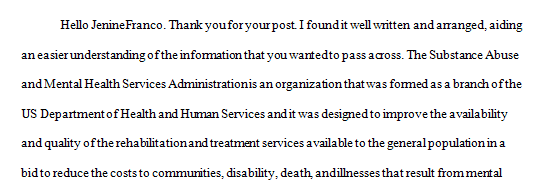The Substance Abuse and Mental Health Services Administration (SAMHSA) is dedicated to promoting mental health
EBP MODULE 1 Discussion 1
Amber Jenine Franco
The Substance Abuse and Mental Health Services Administration (SAMHSA) is dedicated to promoting mental health, preventing substance abuse, and providing treatment and support (SAMHSA, 2023). A Workforce Strategic Plan is implemented to enhance quality care through evidence-based and evidence-informed practices (SAMHSA, 2023). This plan also recommends using data to strengthen the healthcare workforce (SAMHSA, 2023). Studies have found an absence of joy and meaning experienced by healthcare workers (Sikka et al., 2015). Evidence-based practice (EBP) involves the best evidence from studies and patient care data to help deliver the highest quality of care (Melnyk et al., 2010).
The work of SAMHSA is guided by four core principles, including the commitment to data and evidence (SAMSHA, 2023). One goal is to reduce and prevent substance use and misuse. SAMHSA plans to reach this goal by investing in evidence-based and evidence-informed programming and technical assistance (SAMSHA, 2023). Studies have shown that evidence-based practice leads to higher-quality care, improved patient outcomes, and reduced costs (Melnyk et al., 2010). SAMHSA uses EBP and evidence-informed programs, campaigns, curricula, and training to educate the public on the effects and harm of substance use and misuse (SAMSHA, 2023). This organization also provides culturally appropriate and EBP technical assistance resources and training to communities, especially disenfranchised communities (SAMHSA, 2023).
This organization was established in 1992 to provide information about substance use and mental health disorders through services and research (SAMSHA, 2023). They have accomplished their mission and vision using EBP and evidence-informed practices over the years. It has been found that an organizational culture that encourages clinical decisions based on evidence is essential for improving and maintaining safe and high-quality patient care (Kim et al., 2016). SAMHSA is known for using and providing multiple sources and surveys to better understand mental illness and substance use disorders in America (SAMHSA, 2023). This resourceful organization offers many tools and resources to provide the best care for the mental health population.
References
Kim, S. C., Stichler, J. F., Ecoff, L., Brown, C. E., Gallo, A.-M., & Davidson, J. E. (2016). Predictors of
evidence-based practice implementation, job satisfaction, and group cohesion among
regional fellowship program participants. Worldviews on Evidence-Based Nursing, 13 (5),
340-348. doi:10.1111/wvn.12171
Melnyk, B.M., Fineout-Overhold, E., Stillwell, S.B., & Williamson, K.M. (2010). Evidence-based
practice step-by-step: The seven steps of evidence-based practice. American Journal of
Nursing, 110 (1), 51-53.
Sikka, R., Morath, J. M., & Leape, L. (2015). The Quadruple Aim: Care, health, cost, and meaning
in work. BMJ Quality and Safety, 24, 608-610. doi:10.1136/bmjqs-2015-004160
Substance Abuse and Mental Health Services Administration (SAMHSA). (2023). Retrieved on
August 26, 2023, https://www.samhsa.gov/
Respond to your colleagues on by visiting the websites they shared and offering additional examples of EBP or alternative views/interpretations to those shared in your colleagues’ posts.
Answer preview to The Substance Abuse and Mental Health Services Administration (SAMHSA) is dedicated to promoting mental health

APA
334 words


